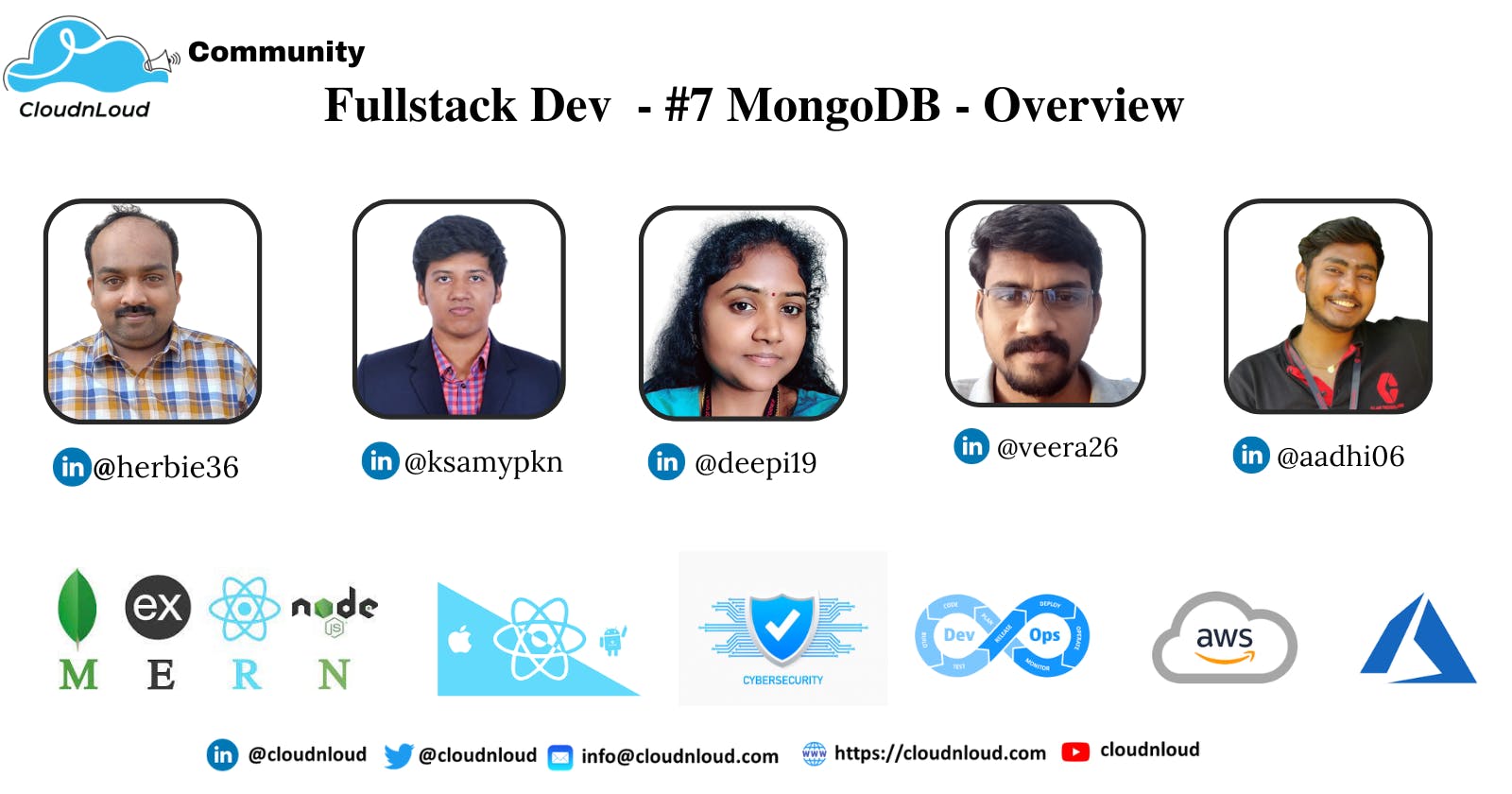In this blog, we are going to discuss about NoSQL Fundamentals, MongoDB basics and Advanced concepts
Intro - NoSQL
NoSQL can be defined as a database that is employed for managing the massive collection of unstructured data when your data is not piled up in a tabular format or relations like that of relational databases. The term NoSQL came from the word non-SQL or nonrelational. There are a wide variety of existing Relational Databases that have been unsuccessful in solving several complex modern problems such as:
A dynamic change in the nature of data - i.e., nowadays data are in structured, semi-structured, nonstructured as well as polymorphic in type.
The variety of applications and the type of data feed into them for analysis has now become more diverse and distributed and is approaching cloud-oriented.
Also, modern applications and services are serving tens of thousands of users in diverse geo-locations, having various time zones. So data integrity needs to be there at all the times.
Types of NoSQL Database
- Document-type databases
- Key-Value stores
- Graph stores
- Wide-column stores
Benefits of NoSQL
- High elastic Scalability
- Valuable and reliable for big data
- Reduced dependence/trust in in-house DBAs
- It's Easy to understand
- Agile data models
MongoDB - Fundamentals
Mongo DB can be defined as a document-oriented database system that uses the concept of NoSQL. It also provides high availability, and high performance, along with automatic scaling.
Database : In MongoDB, a database can be defined as a physical container for data collection.
Collection : Collections can be defined as a cluster of MongoDB documents that exist within a single database.
Document : A document can be defined as a collection of key-value pairs that contain dynamic schema.
Okay. The theory part is over. Let's get into hands-on part
MongoDB Installation
To get started with MongoDB, you have to install it in your system. You need to find and download the latest version of MongoDB, which will be compatible with your computer system. You can use this http://www.mongodb.org/downloads
MongoDB - Basics
Create Database
use cloudnloud_db;
Drop Database
db.dropDatabase();
show Database
show dbs;
Create Collection
db.createCollection("developers");
Drop Collection
db.developers.drop();
Insert Documents
insert()
db.collection_Name.insert(JSON document)
insertOne()
db.developers.insertOne({ _id: 1, name: "Veera" , skills : "blockchain"})
insertMany()
db.developers.insertMany(
[
{ _id: 2, name: "Kanna" , skills : "blockchain"},
{ _id: 3, name: "Karthik" , skills : "cybersecurity"},
{ _id: 4, name: "Deepika" , skills : "Node js"},
{ _id: 5, name: "Aadhi" , skills : "python"},
]
)
Query Documents
db.developers.find()
db.developers.find().pretty()
Filtering in Queries
db.developers.find( { skills: "blockchain"} )
db.developers.find({$or: [ { skills: "blockchain" }, { name: "karthik" } ] } )
db.developers.find( { "skills": { $in: [ "blockchain", "python" ] } } )
Update Documents
db.developers.update(
{_id: 4},
{
$set: { instrument: 'blockchain' }
}
)
Delete Documents
db.collection.deleteOne()
db.developers.deleteOne( { name: { $in: [ "Veera", "Kanna"] } } )
db.collection.remove()
db.developers.remove( {} )
db.collection.deleteMany()
db.developers.deleteMany( { name: { $in: [ "Veera", "Kanna" ] } } )
Aggregation
MongoDB offers three different ways of performing aggregation:
- The aggregation pipeline.
- The map-reduce function.
- Single purpose aggregation methods
db.developers.aggregate([{$group : {_id: "$skills", TotalRecords: {$sum : 1}}}])
- $sum - adds up the definite values of every document of a collection.
- $avg - computes the average values of every document of a collection.
- $min - finds and returns the minimum of all values from within a collection.
- $max- finds and returns the maximum of all values from within a collection.
- $push - feeds in the values to an array in the associated document.
- $first - fetches out the first document.
- $last - fetches out the last document.
- $addToSet- feeds in the values to an array without duplication.
Sorting
db.techSubjects.find({}, {"topic":1, _id:0}).sort({"topic":1})
Hope you can understand the basic commands in MongoDB
let's move on Advanced concepts
MongoDB - Advance
Indexing
Databases having indexes make queries performance more efficient.
When you have a collection with thousands of documents and no indexing is done, your query will keep on finding certain documents sequentially.
Create an Index in MongoDB
db.collection_name.createIndex( {KEY:1, KEY:2} )
db.Users.createIndex({"PhoneNo":1})
Advance Indexing
Indexing Fields for Sub-Documents
db.users.ensureIndex( {"location.city":1,"location.country":1} )
db.users.find({"location.city":"Los Angeles"})
DB Replication
mongod --port "PORT" --dbpath "your_db_complete_path" --replSet "instanceName_of_Replica_set"
mongod --port 27017 --dbpath " C:\Program Files\MongoDB\Server\4.0\data" --replSet rs0
DB Export
Export to json
mongoexport --db cloudnloud_db --collection developers --out /developers.json
Export to CSV
mongoexport --db cloudnloud_db --collection developers -type = csv --out /developers.csv
DB Backup and Restore
mongodump
For creating a backup of your database in MongoDB, make use of the command mongodump.
mongodump -d <database name> -o <backup-folder>
mongodump -d cloudnloud_db -o /backup
mongostore
For restoring all your backup data in your server, MongoDB provides the command mongorestore.
mongorestore -d <database name> --dir <backup-folder>
mongorestore -d cloudnloud_db --dir /backup
Regular EXperession
Use $regex Operator
db.developers.find( {name : {$regex: "vee" }} )
Case Insensitive
db.developers.find( {name : {$regex : "vee", $options:"$i"} })
that's guys. Hope you can get better insights about MongoDB
Keep Learning & Keep Growing

